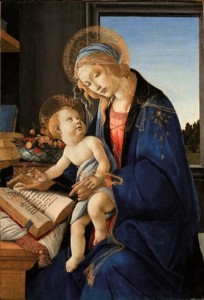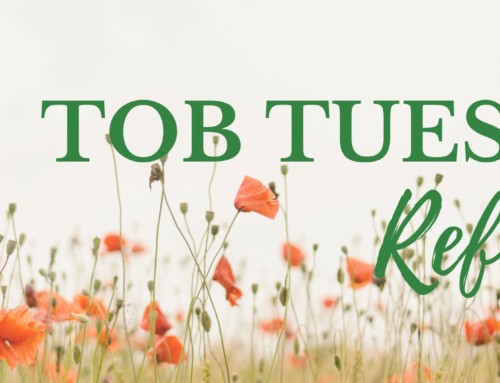This week’s TOB Tuesdays is a special edition, “Mary, Mother of God?” by Deacon Doug Bogart.*
 When I was still an Evangelical Protestant, before being received into the fullness of the faith in the Catholic Church over 20 years ago, I had a hard time with the notion of Mary as the Mother of God. It wasn’t that I didn’t think she was special or that God had chosen her to be the mother of Jesus, but to call her God’s Mother? That didn’t make sense. She was just a human.
When I was still an Evangelical Protestant, before being received into the fullness of the faith in the Catholic Church over 20 years ago, I had a hard time with the notion of Mary as the Mother of God. It wasn’t that I didn’t think she was special or that God had chosen her to be the mother of Jesus, but to call her God’s Mother? That didn’t make sense. She was just a human.
I wasn’t alone in my understanding, or I should say misunderstanding, of Mary’s role in the birth of Jesus. Over 1500 years ago, this term, “Mother of God,” rocked the whole Church and even caused riots in the streets. It took an Evangelical Council in 431 AD, the Council of Ephesus, to restore order and to declare definitively that the title of Theotokos, or Mother of God, belonged to Mary.
Of course, as an Evangelical, I didn’t know any of this early Church history. It just seemed presumptuous to call a human being, “the Mother of God.” But the problem wasn’t with my understanding of Mary as a human being. The problem for me and all my Evangelical and Protestant family and friends was with our understanding of Jesus.
Every Sunday, we profess that the second Person of the Holy Divine Trinity was “incarnate of the Virgin Mary and became man.” If we were to say that Mary was mother only of Jesus’ human nature, this would divide Jesus into two persons. But that’s false. Jesus didn’t come to earth, borrow a human body for a while, and then return to heaven in purely His Divine Nature. Likewise, Jesus didn’t get hungry and tired only in his human nature and then do miracles in his divine nature. Jesus is one Person, human and divine acting together.
God became man in the womb of Mary. Mary gave birth to God! God the Son united Himself with a human nature completely and forever. And that union can never be separated.
St. Athanasius famously said, “God became man so that man could become God.” Of course, this doesn’t mean that we become Gods – capital G – on equal footing with God the Father, ruling over our own universe. On the contrary, God became one with our humanity so we could become one with His divinity.
In the second reading for the Solemnity of Mary, Mother of God, on January 1, we read, “When the fullness of time was right, God sent His Son, born of a woman… so that we might receive adoption as sons.” God entered humanity through Mary, the Mother of God. This is the climax of human history: God makes the ultimate, supreme gift of Himself – he so completely identifies Himself with His creation by taking on human flesh in such a way that we could never be separated again. He had a body that was like ours, weak and powerless at His birth, growing and changing through His youth, strong and yet subject to weariness and pain as an adult.
God entered humanity through Mary, the Mother of God. This is the climax of human history: God makes the ultimate, supreme gift of Himself – he so completely identifies Himself with His creation by taking on human flesh in such a way that we could never be separated again.
To express the fullness of His love, God couldn’t come to us only in some spiritual sense or with a divided nature. He had to be enfleshed, incarnated, embodied as we are. As human persons, we are embodied spirits. This means it’s impossible for us to love without our bodies.
Try it. Look at your neighbor or your spouse or your child and express your love for him or her without using your body. It’s impossible. You can’t even gaze into their eyes to express love because your eyes are part of your body. So, in order for God to fully express His love for us, and for us to be able to fully receive His love, He became incarnate. He united His divinity to our humanity.
St. John Paul II, in his 1984 encyclical on the Holy Spirit (Dominum et vivificantem), wrote these words: “The conception and birth of Jesus Christ are in fact the greatest work accomplished by the Holy Spirit in the history of creation and salvation: the supreme grace ‘the grace of union… source of every other grace.’“ When Mary said “Yes” to the angel Gabriel, she said “Yes” to the greatest action of the Holy Spirit in all of creation – the one-flesh union of divinity and humanity in her womb.
During the masses in which I serve as deacon, I have the privilege to stand off to the side of the altar and pour some wine and a few drops of water into the chalice during the Eucharistic prayer. As I do so, the Church tells me to quietly pray, “By the mystery of this water and wine, may we come to share in the divinity of Christ, who humbled Himself to share in our humanity.” Has that prayer ever caught your attention? I hope it will leap out at you in the future: Christ humbled himself to share in our humanity so that we can share in His divinity. We “become partakers of the divine nature,” as 2 Peter 1:4 tells us.
Because Mary said “Yes” to becoming the Mother of God, then the Son of God and son of Mary was born, grew to manhood, taught the ways of the Kingdom, healed the sick, raised the dead, cast out demons, suffered, died, and was buried. On the third day, He rose from the dead and is now seated at the right hand of the Father with a glorified human nature whose human DNA came from Mary!
When you receive Holy Communion, you aren’t just fulfilling some religious activity or merely receiving a symbol of God’s love. You receive the Son of God’s fully divinized human body into your body. You participate in the one-flesh, nuptial union of God and man. In the Holy Eucharist, the Bridegroom says to His Bride, “Come, be with me forever, come to the wedding feast!”
Thanks to the Holy Spirit and to Mary, the Mother of God, you will receive “the grace of union…source of every other grace.” You will receive Jesus Christ: body, blood, soul, and divinity.
Thanks to the Holy Spirit and to Mary, the Mother of God, you will receive “the grace of union…source of every other grace.” You will receive Jesus Christ: body, blood, soul, and divinity. His divine life will penetrate you and give you true life, eternal life, the fullness of life. And if you let His divine life take root and grow in you, it will flower and produce fruit, abundant fruit so that You.Will.Be.A.Saint. Holy Mary, Mother of God, pray for us!
*Deacon Doug Bogart is the Associate Director of Education and Formation in the Office of the Diaconate for the Diocese of Phoenix, AZ.




